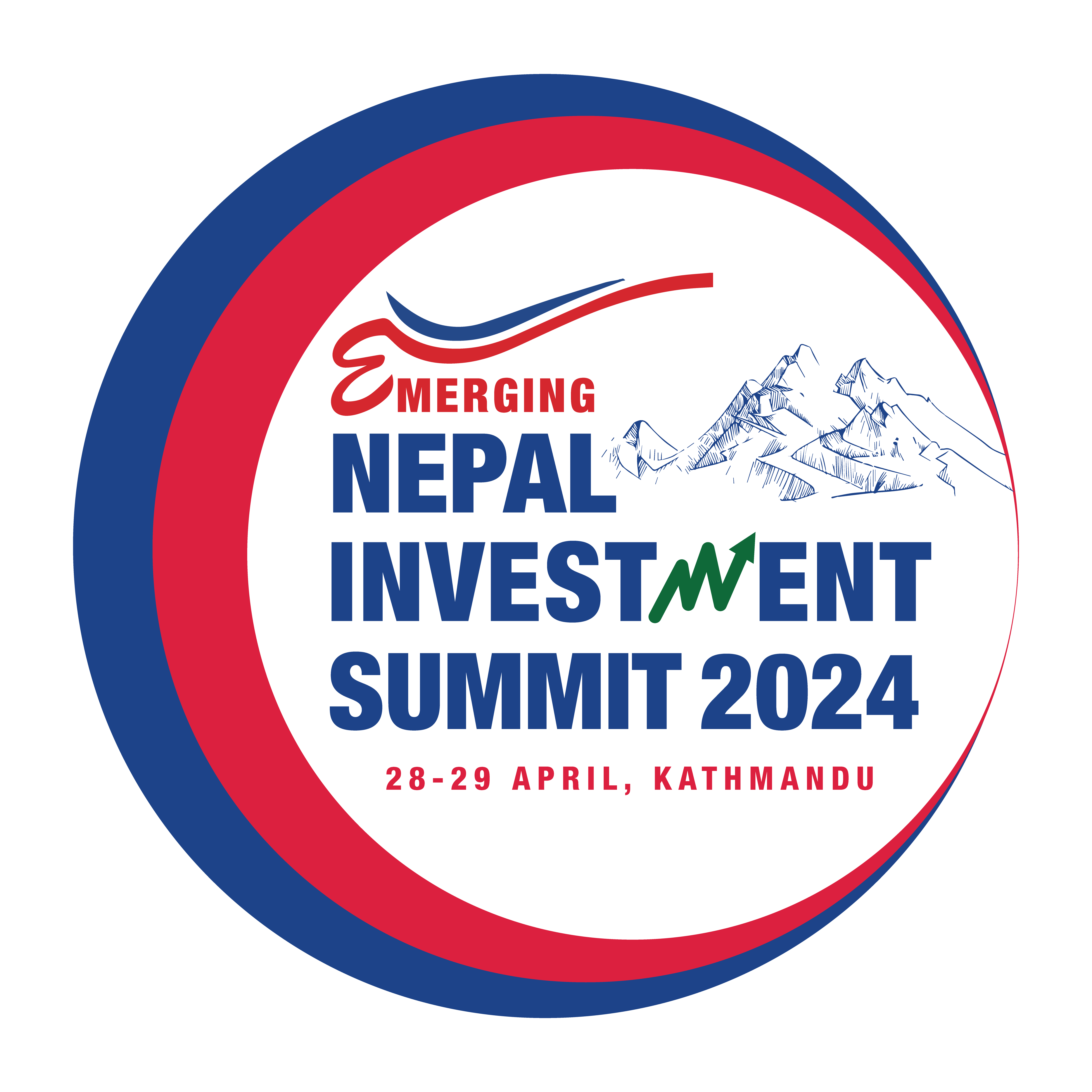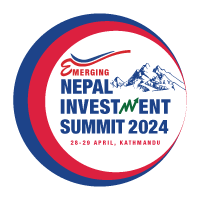Frequently Asked Questions
General Information:
1. What is the main objective of the Nepal Investment Summit 2024?
Designed as a premier platform convening leaders from government, business, and development partners, the Nepal Investment Summit 2024 highlights recent improvements to Nepal’s investment landscape, connects potential investors with key decision-makers, and showcases ready-to-invest projects and other investment opportunities in diverse sectors.
2. Can you provide details on the agenda or schedule of events?
Please find the details on the agenda and schedule of events by clicking here.
3. Is there a registration fee for attending the summit?
There is no fee for attending the summit. However, registration through the event’s website is required. Please ensure to complete your registration here in order to receive confirmation and secure your participation in the summit.
4. Will there be opportunities for networking with the event attendees?
One of the key highlights of the event is the “Meet the Prime Minister” session. The two-day event will include dedicated business-to-business and business-to-government meetings. Separate sessions with existing investors can also be arranged. To express your interest in participating in such meetings, please write to us at nis2024@investinnepal.gov.np. Additionally, ample networking opportunities will be available during breaks, lunch, and dinner hours.
Logistics and Travel:
5. Can you provide information on accommodation options for attendees coming from abroad?
Please note that attendees are responsible for their own accommodation and travel expenses. On Day 1 – Lunch & Dinner will be provided and on Day 2 – Lunch & Hi-tea will be provided. For international participants, we have compiled a list of recommended accommodation options in close proximity to the event venue for your convenience. The hotels will be offering special discounted rates to accommodate NIS 2024 participants. Upon confirmation of your attendance, you will receive an email containing the links to discounted prices for the following lodging options:
1. Hotel Soaltee Kathmandu
2. Kathmandu Hotel Marriott
3. Fairfield by Marriott Kathmandu
4. Hyatt Place Kathmandu
5. The Everest Hotel
6. Raddison Hotel Kathmandu
7. Basera Boutique Hotel Kathmandu
6. Are there shuttle services available for airport pickup and drop?
The nearest airport to the venue is Tribhuvan International Airport, located just 10 kilometers away. The hotels listed above will provide shuttle services upon request. Please check in with your hotel for more information.
7. Are there any transportation options to and from the venue?
Transportation to and from the event venue has to be managed by participants themselves. Please check in with your hotel if they provide the service. For the participants staying in the hotels listed above and opting for shuttle services, the hotel will provide transportation service to and from the event venue on both days.
8. Can you provide information on parking facilities for attendees?
Registered participants will have access to parking facilities conveniently located within the premises of the Hotel Soaltee, where the event is taking place.
Project Details:
9. Can you provide more details about the category of the projects being showcased?
The summit will showcase 130+ projects across different sectors including energy, healthcare, mining and minerals, urban and industrial infrastructure, transportation, manufacturing etc. The projects are further categorized according to the stages of their investment readiness and sources. A few projects are expected to see the signing of Project Development Agreement or the Project Investment Agreement with the project developers. Expressions of interest (EoI) will be called on about 15 projects. Nearly 50 projects will be presented for market sounding as well as to gauge the interest of potential investors and receive feedback. Projects have been mostly sourced from various ministries of the government. Some local government and private sectors projects will be showcased as well.
10. Can you provide more information about specific projects in the renewable energy sector?
The following are some of the energy projects with a combined production capacity of 2753.62 that will be showcased during the summit:
• Naumure Multipurpose Project (218 MW)
• Khimti Those Siwalaya Storage Hydropower Project (1216 MW)
• Humla Karnali Hydropower Project (61.02 MW)
• Upper Chameliya Hydropower Project (53.85 MW)
• Kawadi Khola Hydropower Project (30 MW)
• Kaligandaki-2 Storage Hydropower Project (650 MW)
• Bharbhung Storage Hydropower Project (377.1 MW)
• Tom Dogar Budhigandaki Hydropower Project (40.02 MW)
• Super Budhigandaki Hydropower Project (34.93 MW)
• Karnali Chisapani Wind Power Project (10 MW)
Investment Opportunities:
11. What are some of the incentives offered by the Government of Nepal to the investors?
Incentives are provided in sector-specific acts, regulations, and policies. For example, the Industrial Enterprise Act, 2076 (2020) provides a range of incentives and concessions for various sectors including manufacturing, tourism, mining, development and operation of major infrastructures, intellectual property, etc. For example, under IEA, manufacturing industries are entitled to 20% exemption on income tax and additional 5% exemption on income tax applicable to income earned from exports.
Similarly, the Special Economic Zone Act, 2073 (2016) (“SEZA”) provides separate incentives for industries operating within the special economic zones. These include tax exemption for first 5 or ten years of operation (depending on location) and 50% thereafter; exemption on dividend tax, VAT and customs duty; and rebate on lease rate. SEZA’s provisions override prevailing laws for industries in the economic zones.
The Public-Private Partnership and Investment Act, 2075 (2019) also allows Investment Board to make recommendations to the Government of Nepal for additional incentives.
The above are only a few examples. Please note that all incentives are reflected in the annual Finance Act released by the Ministry of Finance, Government of Nepal. The Finance Act is applicable for the following fiscal year, which runs from mid-July to mid-July of the following year. Please find more information on our Nepal Investment Guide.
12. Are there any specific sectors or industries that are particularly ripe for investment in Nepal?
The energy sector, particularly hydropower projects, emerges as a lucrative investment opportunity. Nepal recently signed a deal to export 10,000 MW power to India over the next 10 years. Nepal and Bangladesh recently reached an agreement on the tariff for power export. Investments in hydroelectricity projects in Nepal have seen profitable exits within 5-7 years through IPOs. Solar energy, wind energy, and waste-to-energy sectors also offer good investment opportunities in Nepal.
Tourism infrastructure can be expected to provide good returns on investment. Nepal has seen an influx in tourist arrivals in recent years.
The tech sector is rapidly growing in Nepal. The availability of homegrown tech talents and increases in tech services exports in recent years demonstrate promising investment opportunities within this sector.
Nepal’s manufacturing sector is attractive to investors due to duty-free market access in India, China, the EU, and neighboring markets. The growing middle-class segment along with government concessions on income tax for manufacturing and agro-processing items, particularly in special economic zones, signals opportunities. Profitable industries include cement, pharmaceuticals, and textiles.
13. Will there be opportunities to engage with government officials or policymakers regarding investment policies?
Yes, the Nepal Investment Summit 2024 offers several opportunities to directly engage with government officials and policymakers regarding investment policies through panel discussions and pre-arranged B2G meetings. If you have any preferences for meeting specific officials, you can reach out to nis2024@investinnepal.gov.np.
14. What legal and regulatory frameworks govern foreign investment in Nepal?
Public Private Partnership and Investment Act, 2019 and (B) Foreign Investment and Technology Transfer Act, 2019 are two major acts that govern foreign investment in Nepal. Further, other legal regime governing foreign investment include, but are not limited to the following:
(i) Foreign Exchange (Regulation) Act, 1962
(ii) Industrial Enterprise Act, 2016
(iii) Company Act, 2017
(iv) Labour Act, 2017
(v) Income Tax Act, 2002
(vi) Environment Protection Act, 2019
Participant Engagement:
15. Will there be simultaneous translation services available for non-English speakers?
Translation services can be availed to the registered participants who are non-native English speakers. Please write to us your requirements at nis2024@investinnepal.gov.np and we will get in touch with you to accommodate your needs.
16. Are there any sponsorship opportunities available for companies interested in supporting the event?
While NIS 2024 upholds a policy against paid advertisements or endorsements of products and services to maintain the event’s integrity, we warmly welcome companies interested in supporting the summit. If your organization is keen on contributing to the event, we encourage you to contact our NIS 2024 Secretariat (nis2024@investinnepal.gov.np) for further discussion on how you can be involved.
17. How can interested parties stay connected and informed about updates and developments related to the summit?
To stay connected and informed about updates and developments post-summit, our dedicated team at the Office of the Investment Board Nepal will be in touch with you. For queries regarding investment opportunities after the event, please follow our Facebook, LinkedIn, and Twitter handles or write to us at info@ibn.gov.np

